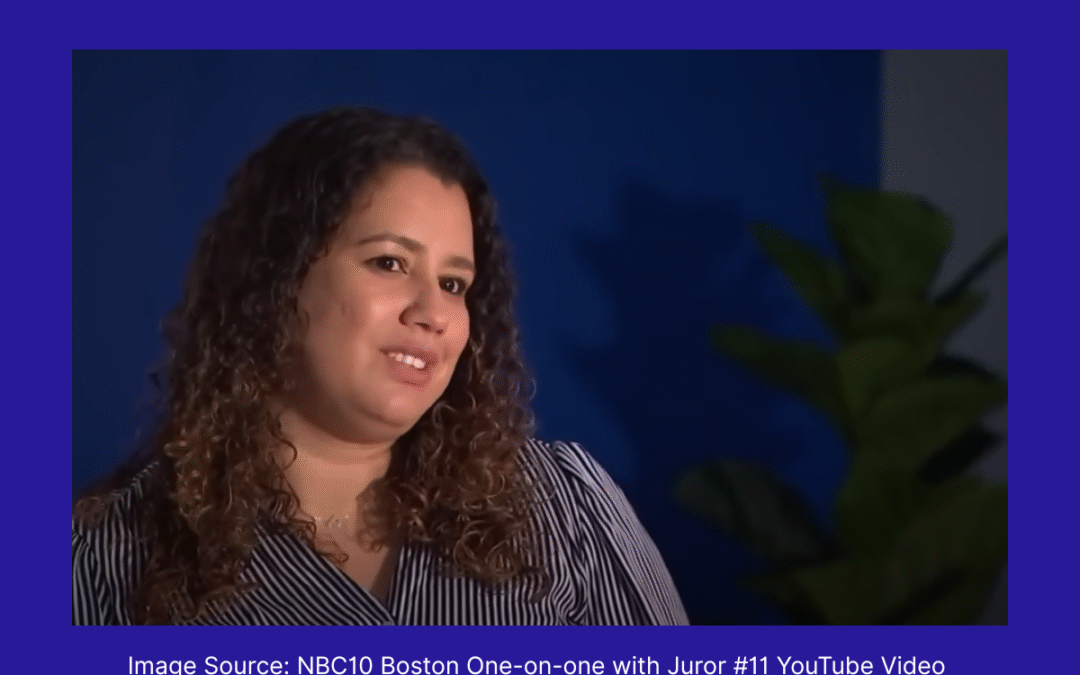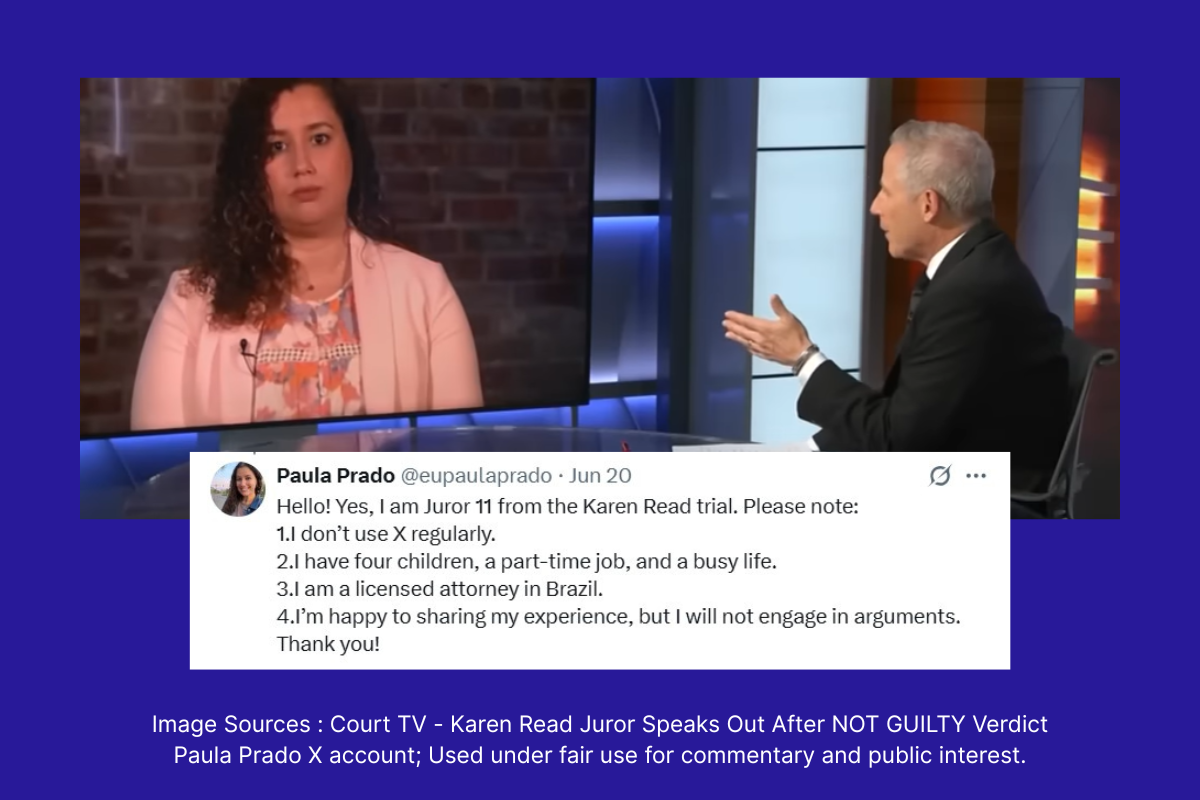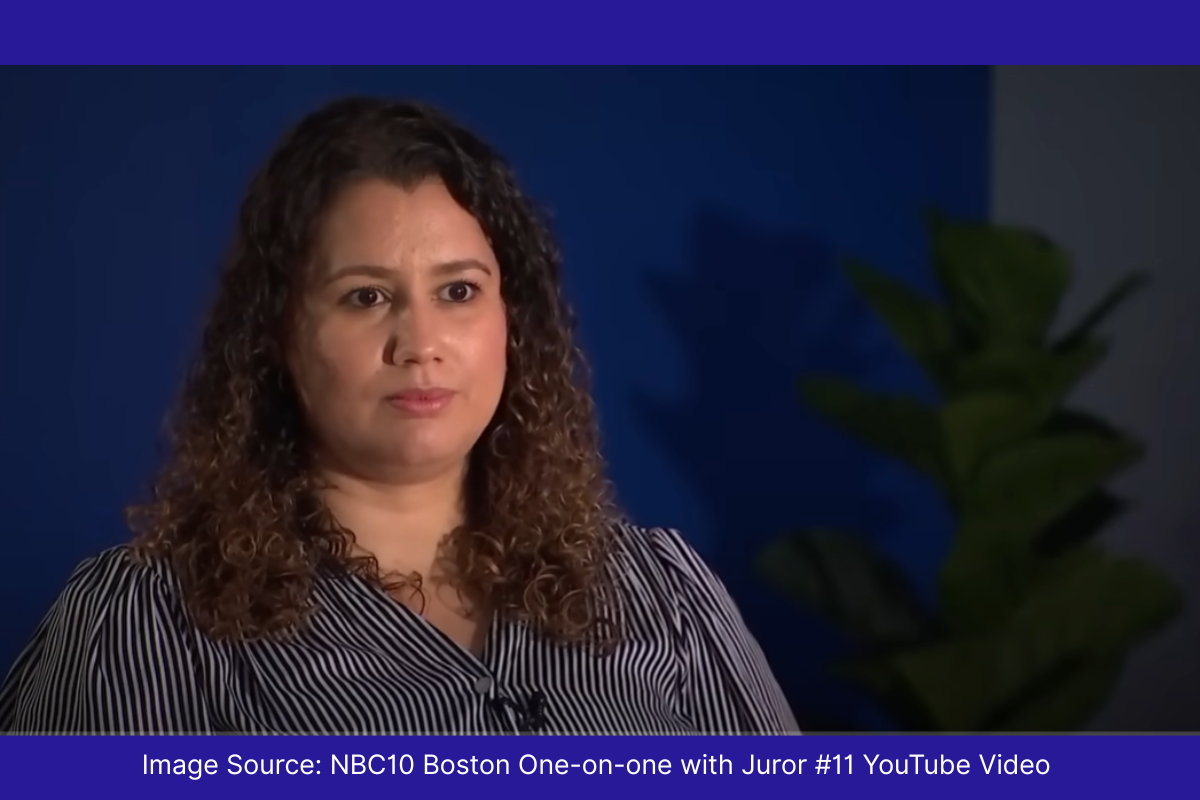📣 So You Wanna Be a Public Juror?
When Post-Trial Spotlight Meets Social Media Backlash
The Karen Read trial ended—but the drama didn’t. As the dust settles, one juror has stepped into the public arena and struck a pose squarely in the spotlight: Paula Prado, known on X (formerly Twitter) as @eupaulaprado, has been posting about the case, defending the verdict, and engaging with followers—and critics.
Cue the backlash.
But here’s the question: Is it harassment? Or just criticism that comes with voluntarily stepping into the arena? Let’s break it down.
👩⚖️ The Massachusetts Legal View
According to Massachusetts law, harassment requires:
A pattern of three or more acts
Aimed at a specific person
With intent to cause fear or emotional distress
That actually results in distress
Unless people are repeatedly threatening her, doxxing her, or targeting her with sustained abuse, it’s not legally harassment. It’s the internet being the internet—often rude, sometimes cruel, but not always criminal.
Prado isn’t being dragged unwillingly into the public sphere. She’s tweeting. She’s replying. She’s doing interviews. She’s choosing to participate. That makes her a public figure by choice, and public figures get criticized. It’s part of the deal.
🧠 What Other Jurors Have Done
Let’s take a look at how other high-profile jurors handled the media after their own big trials:
🟦 Derek Chauvin Trial
A juror did give an interview after the verdict, but didn’t engage on social media. Instead, he faced scrutiny for attending a protest beforehand. No live-tweeting. No selfies. No courtroom defense threads.
🟪 Ghislaine Maxwell Trial
One juror gave interviews about his experience—including his personal history of abuse. That juror faced real legal heat when he failed to disclose that history during voir dire, and the defense filed for a mistrial.
Moral of the story: Talking post-trial can have legal consequences.
🟧 Johnny Depp v. Amber Heard
A male juror spoke anonymously to the media post-trial. He gave insight into the jury’s thinking—but did not post online, comment back, or become a public persona.
🔴 Casey Anthony Trial
Several jurors came forward—but many expressed regret over the verdict and refused interviews out of fear of public reaction. The blowback was intense, even without any online engagement.
🩷 And Then There’s Paula Prado…
Prado isn’t just defending her verdict—she’s branding it.
Public interviews with Vinnie Politan, NBC10’s Sue OConnell, out on the street. ✅
Sarcastic responses to critics on Twitter ✅
Choosing the public battlefield ✅
Deleting and reposting tweets like a Kardashian on a rebrand ✅
And look—she’s allowed to speak. But speech has consequences, especially in highly emotional, high-profile cases. If you’re going to jump into the social media mosh pit, don’t be surprised when elbows fly.
Let’s take a look at a few of her more memorable moments:
“My conscience is clear. Sorry yours isn’t.”
“I’ve been called worse things by better people.”
“One of us sat through the whole trial and deliberated. The other is tweeting conspiracy theories in their pajamas. I’ll let you guess who’s who.”
And finally, her mic-drop moment:
“So, I think it’s time to end my little tour, retire from my attention-seeking career, and head back to work at Target. Because even though I’m an attorney in Brazil, here I’m ‘just a mom.’ A very well-educated mom—who’s now going to enjoy a little silence.”
That “farewell tweet” would land better if she weren’t still replying to critics hours later. But hey—this is Twitter. No one actually logs off.
🕵️♂️ What Happens When the Internet Digs Back?
One thing Prado may not have expected: people started digging. When you step into the spotlight, you sometimes invite a searchlight.
Juror Prado’s social media presence was so high-profile, it sparked responses from across the spectrum—including one from researcher Grant Smith Ellis, who unearthed prior legal history involving her family members. While Prado herself wasn’t implicated, her choice to enter the public spotlight inevitably invited deeper scrutiny.
Another voice joining the fray is John DePetro, a Rhode Island-based media figure with a large following and a strong interest in the Karen Read trial. Like Grant, DePetro has been vocal and thorough in his commentary—and equally willing to dig into the juror’s public persona and connections.
To balance that out, attorney Mark Bederow who represents blogger Aidan Kearney (a.k.a. Turtleboy), has started “reporting” people like DePetro and Grant on social media. It’s an odd flex coming from a criminal defense attorney who should know the boundaries of free speech better than most. The irony? His own client built a following doing exactly what DePetro and Ellis are doing now.
Still, it shows that once someone becomes a public figure—especially in a trial of national interest—the boundaries between public and private life begin to blur.
Legally, this kind of digging isn’t harassment:
It’s not threatening
It’s not false
It’s based on publicly accessible information
This is par for the course in public discourse, particularly when someone voluntarily takes on the role of public commentator.
The Takeaway: Criticism Isn’t a Crime
There’s a difference between being harassed and being criticized for things you say in public about a murder trial. The former can be illegal. The latter? That’s just Tuesday on the internet.
Free speech goes both ways.
If a juror becomes a public commentator, they get treated like one. That includes questions, disagreements, memes, and yes—outrage.
So to any future jurors looking to go viral: Think before you tweet. The courtroom might be done with you—but the court of public opinion is just getting started.
To those joining the commentary, make your point—but be smart, be legal, and don’t cross the line from criticism into cruelty.
Related Articles
Related
Luigi Mangione Death Penalty Dropped, Reshaping Prosecution Strategy
A judge has removed the death penalty as a sentencing option in the case against Luigi Mangione, delivering a major win for the defense and significantly narrowing the scope of the prosecution. The ruling eliminates the most severe potential punishment Mangione faced...
Neo Langston Arrested for Failure to Appear as LA Witness
Neo Langston was arrested in Montana this week on a Los Angeles Superior Court warrant for failure to appear as a witness, according to Lewis and Clark County Jail records. Montana authorities confirmed they were assisting the Los Angeles Police Department’s...
Hold On a Minute: What Media Is Saying About Nick Reiner
There has been exactly two real developments in the Nick Reiner case: a change in attorneys and a new arraignment date set. That’s it. No evidence dump.No discovery.No probable cause affidavit released.No forensic details confirmed on the record. And yet somehow —...



